COMMISSION ON THE STATUS OF WOMEN
The Presidential Commission on the Status of Women is dedicated to the improvement of Clarion University women, regardless of age, race, class, ethnicity, disabilities, and/or sexual orientation.
Established in 1983 as a subcommittee of the Affirmative Action Committee, the group achieved commission status in 1989 by state mandate. The establishment of the commission responded to the need for an organization dedicated to equity for women, as well as a philosophy of social, political, and economic equality.
Among the programs the commission has developed to address the diverse needs of women at Clarion are:
1. The Returning Adult and Commuting Students (RACS) Center
2. The Women's Studies Program and minor
3. The original Sexual Harassment Committee, now a presidential commission
4. The annual Women's Conference
The commission sponsors the Women's Conference, which is open to the community and provides scholarly discussions of topical issues, experimental workshops from a variety of multicultural perspectives, performing and visual arts opportunities for women, and a celebration of shared camaraderie.
In addition to the Women's Conference, the commission provides consciousness-raising on, and support of, a broad range of women's issues through sponsorship, films, lectures, and workshops presented throughout the academic year. Topics for these events have included issues of:
1. Health
2. Sexual orientation
3. African-American women's perspectives
4. Acquaintance rape
5. Violence against women
6. Sports equity
The Presidential Commission on the Status of Women serves as a programming and advisory body that examines equity issues and monitors university policy. In this monitoring role, the commission seeks to ensure that the university and all of its constituencies are in compliance with nondiscrimination policies.
The Sexual Assault Network comprises community and university members committed to ending sexual violence in the community. The Sexual Assault Network includes representatives from the state and local police, SAFE, Passages, and Clarion University students, faculty, and administrators.
Among the programs the Sexual Assault Network has sponsored are STAND: A Community Opposes Sexual Assault (a series of presentations on sexual assault), Break the Silence Week, the Clothesline project, Men Speak Out about Sexual Assault, and the fraternity Violence Education Project.
Co-Chairs: Carol Brennan Caplan, ext. 1955, and Kaersten Colvin-woodruff, ext. 2382
Treasurer: TBA
Secretary: Jamie Phillips, ext. 2391
Women's History MOnth
March is Women's History Month. In past years, the PCSW has sent out biographies of women in history each Wednesday and Friday in March. This year, the commission tried something different in order to digitally preserve the biographies and to make them more accessible to the broader community. Thanks to the suggestion, expertise, and time of Dr. Lacey Fulton and her communication students, the biographies written by our PCSW members have been converted into short videos and are now available on Clarion University's YouTube Channel.
The following videos on these important women in history have either been uploaded and are ready for you to view (follow the links) or they will be uploaded shortly.
- Jane Addams: Written by PCSW member Laurie Pierce
- Dr. Esther Duflo (Forthcoming): Written by PCSW member Sandra Trejos
- Dr. Carla Hayden: Written by PCSW member YooJin Ha
- Diane Roberts: Written by PCSW co-chair Kaersten Colvin-Woodruff
- Sojourner Truth (Forthcoming): Written by PCSW member Bell O'Neil
- Lt. Reba Whittle: Written by PCSW member Laurie Bladen
- Women's History Introduction (Forthcoming): Written by PCSW member Jeffrey Diamond
inspirational Women
Dr. Jerri lippert
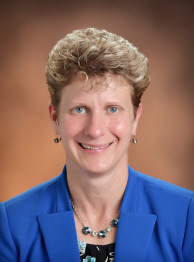 Dr. Jerri Lippert is being recognized as a woman who has been highly successful in
both her professional and athletic achievements.
Dr. Jerri Lippert is being recognized as a woman who has been highly successful in
both her professional and athletic achievements.
Lippert's professional career began as a physical education teacher. She taught physical education for five years while completing her administrative papers and doctorate degree. Jerri then went to the City of Pittsburgh for four years as a school-based administrator (assistant principal then principal). She was then promoted into the central office and eventually became the Chief Academic Officer in the Pittsburgh Public Schools. She is now the Superintendent of West Allegheny School District, where she has been since 2014. In her short time in the Allegheny School District, she has made many improvements within the school district.
Some of Jerri's accomplishments as superintendent of West Allegheny School District include:
- Partnering with the local library to bring a Mobile Book Bus to the community. The focus of the Mobile Book Bus is to develop early literacy for under-privileged communities in West Allegheny.
- Introducing an Early College in High School Academy in partnership with CCAC. This program is designed to provide students from West Allegheny the opportunity to earn college credits and certificates while completing courses for high school graduation.
- Two years after becoming the superintendent at West Allegheny, the high school ranked first in the nation for the largest percent increase in advanced placement qualifying exam scores in math, science, and English. The increase was 544 percent.
Additional professional accomplishments that Jerri is most honored with include:
- The University of Pittsburgh Distinguished Legacy Laurette Alumni Award in 2010
- The Pittsburgh City Council Proclamation that June 11, 2010 was declared "Dr. Jerri Lynn Lippert Day" in the city of Pittsburgh for the work she did in the Pittsburgh Public Schools.
Lippert's athletic achievements are equally impressive. She holds eight world bench press records and 17 national bench press records. She also set two world deadlift records. Her best lifts are as follows:
- 2003 World Association of Bench Press and Deadlift: 352 and 374.2 pound bench press with a body weight of 140 pounds
- 2002 WPO World Powerlifting Organization Arnold Classic: 330 and 349 pound bench press with a body weight of 136 pounds
- 2001 WABDL World Championships: Bench press 319.5 and deadlift of 413.2 with a body weight of 132 pounds
- The 374.8 bench press at a body weight of 140 pounds ranked Jerri as all-time third highest lift in the world in the 148-pound division.
- The 319.7 bench press ranked Jerri as the eighth all-time best bench press in the world in the 132-pound division.
- The 374.8 bench press is ranked as the eighth all-time historical greatest female bench press to body weight coefficient at 2.68 times her body weight.
- She is ranked as the sixth all-time historical greatest female bench presser by formula.
Her path to powerlifting is not only interesting, but also inspirational for those who are struggling to overcome an unexpected challenge. Lippert was a successful distance runner in high school. So successful, that she had a scholarship to run both cross country and track at Duquesne University.
Unfortunately, a major ankle injury during her senior year of high school resulted in her needing surgery. She was red shirted her freshman year at Duquesne University but remained committed to running again. She stayed fit by cycling and lifting weights. Once she came to the realization that she would not be capable of running at the same intensity, she decided to change gears. She began competing as a cyclist and eventually a triathlete.
As a cyclist, Lippert completed a double century ride from Pittsburgh to Columbus, Ohio in one day. She logged more than 200 miles of cycling in 13 hours. Throughout this time, Lippert had also continued lifting weights.
Emmeline Pankhurst
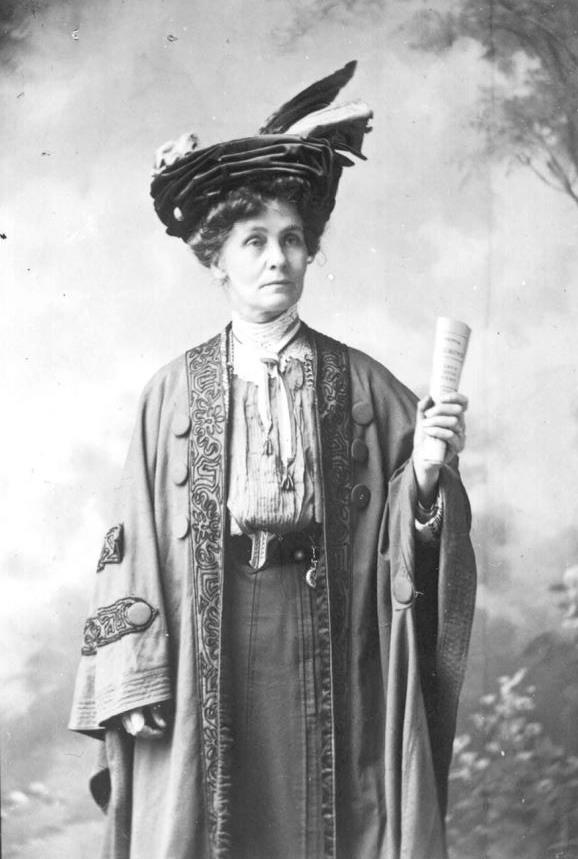 Emmeline Pankhurst (1858–1928) was a major suffragette leader in early 20th century
Britain - advocating for the right of women to vote. Many credit her as one of the
leading female figures of twentieth century Britain and she also is listed as one
of Time's 100 Persons of The Century in 1998. This is because her influence extended
far beyond the shores of her country - helping to push governments to grant women
the right to vote across Europe and North America by the then end of World War I.
Emmeline Pankhurst (1858–1928) was a major suffragette leader in early 20th century
Britain - advocating for the right of women to vote. Many credit her as one of the
leading female figures of twentieth century Britain and she also is listed as one
of Time's 100 Persons of The Century in 1998. This is because her influence extended
far beyond the shores of her country - helping to push governments to grant women
the right to vote across Europe and North America by the then end of World War I.
While today it would be difficult to find a person in Europe or North America who advocates that women should not be able to vote, only a century ago that attitude was widespread. Indeed, 2019 is the centenary of the US Congress passing the 19th Amendment granting women the right to vote in the United States, and this development was influenced by global movements -including Pankhurst's movement that resulted in granting British women the right to vote in 1918.
Pankhurst helped to found and lead the Women's Social and Political Union in 1903. Prior to founding the WPSU, she joined the Independent Labour Party in 1893 and soon became part of its leadership. After the death of her husband in 1898, she worked with women in an impoverished section of industrialized Manchester, England, and she realized it was important that women gained the right to vote in order to help alleviate poverty. Thus, in 1903, she helped organize the WPSU and used the slogan "Deeds not Words."
After seeking peaceful and legal means to advocate change, the WPSU realized the British government would not readily grant women the right to vote. The organization then advocated what was seen at the time as a more radical approach in order to achieve their goals by later 1905 - starting with public protests and arrests - challenging public perceptions about women.
The WPSU soon became what was seen as 'militant,' including leading a demonstration against the British Parliament in 1912 with stones - breaking windows of businesses and government offices. Her trial helped to raise her profile as she argued the lack of political change led her organization to a more militant approach. She also visited North America around this time, helping to advocate for the right for women to vote here as well.
By 1918, the British Parliament granted women over the age of 30 the right to vote due to the efforts of the WPSU and other women's organizations. Pankhurst died in June 1928 (just as all women over the age of 21 were being granted the right to vote in Britain), and her legacy has influenced countless lives. Every time you exercise your right to vote, it is important to remember people had to fight (sometimes peacefully and sometimes giving their life) for that right.
Dr. nancy Falvo
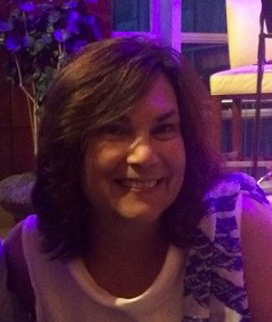 Dr. Nancy Falvo has dedicated her career and her life in helping women. Falvo has
developed many community programs that engage women to improve their health and education.
In August of 1989, she helped create the MSN FNP program with Slippery Rock University.
In addition to this program, she received a $250,000 grant from the Health Resources
& Services Administration to develop the Advancement of Telehealth to deliver the
Master's in Science in Nursing program to Warren County as this county was a medically
underserved area in the Commonwealth. Dr. Falvo was able to educate eight women from
Warren General Hospital to become Family Nurse Practitioners.
Dr. Nancy Falvo has dedicated her career and her life in helping women. Falvo has
developed many community programs that engage women to improve their health and education.
In August of 1989, she helped create the MSN FNP program with Slippery Rock University.
In addition to this program, she received a $250,000 grant from the Health Resources
& Services Administration to develop the Advancement of Telehealth to deliver the
Master's in Science in Nursing program to Warren County as this county was a medically
underserved area in the Commonwealth. Dr. Falvo was able to educate eight women from
Warren General Hospital to become Family Nurse Practitioners.
In 2001, Falvo received another grant for $1.2 million from the Tobacco Settlement funds and started the Health Science Education Center, (which was located on Main Street, Clarion, Pennsylvania). Over the nine years that the HSEC was in operation, Falvo received a total of $13 million dollars to providing health education programs to more than 25,000 residents (mainly women and children) in a five-county area that was free to all participants.
Falvo represents faculty from the Pennsylvania State System of Higher Education as the secretary on the Board of the Center for Rural Pennsylvania. As a board member of the Center for Rural Pennsylvania, Falvo helps to sustain the vitality of Pennsylvania's rural and small communities by identifying policy options for legislative and executive branch consideration and supporting the challenges of diverse communities and women.
In her spare time, Falvo works with members of the community including representatives from several treatment programs for opioid addiction located throughout the state. Falvo is an advocate and catalyst for women in overcoming adversity and is an inspiration to other women.
Rigoberta Menchú
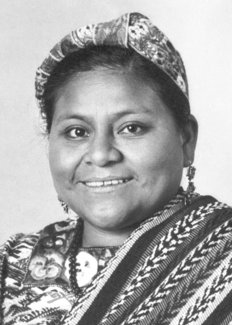 Rigoberta Menchú was born on Jan. 9, 1959, to a poor Indian peasant family and raised
in the Quiche branch of the Mayan culture. In her early years she helped with the
family farm work, either in the northern highlands where her family lived, or on the
Pacific coast, where both adults and children went to pick coffee on the big plantations.
Rigoberta Menchú was born on Jan. 9, 1959, to a poor Indian peasant family and raised
in the Quiche branch of the Mayan culture. In her early years she helped with the
family farm work, either in the northern highlands where her family lived, or on the
Pacific coast, where both adults and children went to pick coffee on the big plantations.
As a young woman, she became an activist in the local women's rights movement and joined with the Catholic church to advocate for social reform. The activism of Menchú and her family led to persecution by Guatemala's military government. When a guerrilla organization became active in their region, her father, a leader of a peasant organization opposed to the government, was accused of guerrilla activities.
During Guatemala's ensuing civil war, he died in a fire while protesting human rights abuses by the military. Menchú's younger brother was kidnapped, tortured, and killed by a military death squad in 1979, and her mother was kidnapped, raped, mutilated, and murdered by soldiers the following year.
Menchú fled to Mexico in 1981 and was cared for there by members of a liberal Roman Catholic group. She soon joined international efforts to make the Guatemalan government cease its brutal counterinsurgency campaigns against Indian peasants, becoming a skilled public speaker and organizer in the course of her efforts.
Menchú gained international prominence in 1983 with her widely translated book I, Rigoberta Menchú, in which she tells the story of her impoverished youth and recounts in horrifying detail the torture-murders of her brother and mother. She received the Nobel Peace Prize in 1992 for her continuing efforts to achieve social justice and mutual reconciliation in Guatemala; she used the prize money to found the Rigoberta Menchú Tum Foundation, an Indian advocacy organization. In the late 1990s, her autobiography became the center of controversy after its veracity was questioned, most notably by David Stoll in Rigoberta Menchú and the Story of All Poor Guatemalans (1999).
Despite alleged inaccuracies in her story, Menchú continued to earn praise for bringing international attention to the situation in Guatemala. In 2004, she accepted President Óscar Berger's offer to help implement the country's peace accords.
Menchú created the Indian-led political movement Winaq (Mayan: "The Wholeness of the Human Being") in February 2007. That September, as the candidate of a coalition between Winaq and the left-wing Encounter for Guatemala party, she ran for president of Guatemala but earned less than 3 percent of the vote. Her 2011 presidential bid was also unsuccessful.
Kate M. Scott
 Kate M. Scott was born in 1837 and relocated to Jefferson County in 1857. She answered
the call of Col. Amor A. McKnight to serve as a Civil War nurse and provide aid to
the injured men and served from 1879-1891. However, it was the time after the war
the Scott is most noted for.
Kate M. Scott was born in 1837 and relocated to Jefferson County in 1857. She answered
the call of Col. Amor A. McKnight to serve as a Civil War nurse and provide aid to
the injured men and served from 1879-1891. However, it was the time after the war
the Scott is most noted for.
She returned to Brookville after the war and helped to found the Brookville Soldier's Home. This facility is still open and operates as the Pennsylvania Memorial Home. She was also fascinated and inspired by the work of the Association of Army Nurses and served as their National Secretary. Her father founded the "Brookville Republican" newspaper and she contributed several articles. She also edited the "History of Jefferson County," which was published in 1888 and is thought to be the most comprehensive of the time.
Scott also published her own book, titled "History of the 105th Regiment of Pennsylvania Volunteers." Scott was also the Postmistress of the Brookville Post Office after being appointed by President Benjamin Harris.
If you look for stories on Kate Scott, you will undoubtedly find that she is rumored to have given birth to the daughter of John Wilkes Booth, the infamous assassin of President Lincoln. She left the child in Indianapolis with a family and Booth supported the child financially.
Whether or not you buy into the juicy gossip, Scott should be remembered for her activism in the care of soldiers, women's suffrage, humane issues, and temperance. She was an accomplished newspaper writer, author, and avid supporter of veteran's services.
Marion Cuyjet
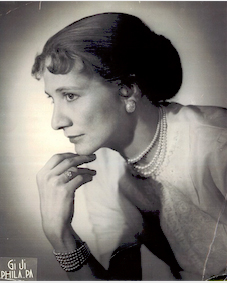 Marion Cuyjet was a nationally and internationally known ballet dancer, teacher and
choreographer working in Philadelphia, Pennsylvania from 1948 to 1996, and was one
of the first women of color to pave the way for African American dancers. Her story
addresses issues of racial identity and social change. She contributed to the analysis
of classical ballet, fundamental teaching approaches, and pedagogical foundations
that would serve dancers in the African American dance community for decades to come.
Marion Cuyjet was a nationally and internationally known ballet dancer, teacher and
choreographer working in Philadelphia, Pennsylvania from 1948 to 1996, and was one
of the first women of color to pave the way for African American dancers. Her story
addresses issues of racial identity and social change. She contributed to the analysis
of classical ballet, fundamental teaching approaches, and pedagogical foundations
that would serve dancers in the African American dance community for decades to come.
She was born Marion Helene Durham on July 29, 1920, in Philadelphia, Pennsylvania. Her parents moved to Philadelphia in 1913 from Cheswold, Delaware, a small community of people whose ancestry was comprised of European, African, and Native American admixtures dating back to the mid-1600s.
Cuyjet's multi-ethnic background was a moving force that helped her to break through racial barriers and navigate her way to a successful career in the ballet community, which was at the time predominantly reserved for whites only.
Due to her fair skin, Cuyjet was able to enroll in the Littlefield Ballet Co. in Philadelphia when she was in her teens, an all-white organization that – like many organizations in the 1930s throughout the U.S. – practiced racial segregation. Unfortunately, the company soon learned about her racial status and removed her from its repertoire.
Cuyjet went on to study with dance master and Harlem Renaissance pioneer Essie Marie Dorsey, who became Cuyjet's prime mentor for years to come. Later both Dorsey and Cuyjet studied Afro-Cuban dance under dance educator and social activist Katherine Dunham. Being exposed to the Dunham approach, Cuyjet took the opportunity to merge classical ballet techniques with a traditional Afro-Cuban dance style.
In 1948, Cuyjet opened her own ballet school in Philadelphia called the Judimar School of Dance which was instrumental in promoting dance education and for encouraging social, recreational, and cultural development in the black community. Several of her students went on to establish fruitful careers in dance, such as world renowned dancer and choreographer Judith Jamison, who danced and taught at the Alvin Ailey American Dance Theater in New York City, and Joan Myers Brown, who founded PHILADANCO (Philadelphia Dance Co.).
Throughout the 1960s, Cuyjet taught dance at the University of Maryland at Eastern Shore, and Cheyney University of Pennsylvania, in addition to running her dance studio. Then in 1971, the studio closed, and Cuyjet worked as a movement therapist for eleven years at the Philadelphia State Hospital at Bayberry.
Cuyjet passed away on October 22, 1996, in Philadelphia of cardio-respiratory failure. Shortly before her death she was awarded an honorary degree from Temple University for her lifelong achievements. After her death, the Philadelphia Dance Co. opened the Marion D. Cuyjet Memorial Dance Studio, and awards students with scholarships each year in her honor.
Inspirational Female Alumni
The following Clarion University alumni served as speakers and panelists for the Women Inspiring Women for Career Success event held Nov. 5 in the Gemmell Multi-Purpose Room.
Lindsay Banner
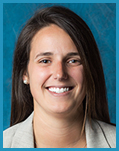 Lindsay Banner is a vice president of MuniCap, Inc., where she has served more than
11 years and has assisted with the preparation of financial projections, public financial
applications, documentation for governmental approvals, and implementation of financial
programs for numerous projects. In her position, Banner actively manages more than
40 differing active large-scale, catalytic development projects and actively participates
in all aspects of the financial structuring of each deal from conception to capitalization
and implementation.
Lindsay Banner is a vice president of MuniCap, Inc., where she has served more than
11 years and has assisted with the preparation of financial projections, public financial
applications, documentation for governmental approvals, and implementation of financial
programs for numerous projects. In her position, Banner actively manages more than
40 differing active large-scale, catalytic development projects and actively participates
in all aspects of the financial structuring of each deal from conception to capitalization
and implementation.
Since 2008, Banner has assisted in providing more than 80 developers and municipalities access to nearly $800 million in capital for construction of public infrastructure through the issuance, refunding, or restructuring of special district bonds. In 2015, Banner began spearheading MuniCap's growth in the Texas market, while fostering growth in the mid-Atlantic and New England, the primary location of her clients. In 2017, Banner relocated to the firm's Texas office to assist in the operational and expansion of the company's footprint in Texas and greater southwestern market. Clients include public entities such as the City of Baltimore, City of East Providence, Lehigh County Industrial Development Authority, the Urban Redevelopment Authority of Pittsburgh, and the Mathis Economic Development Corporation, as well as private entities such as Walton International, Gaylord, Corporate Office Properties Trust, and Howard Hughes Company.
Ms. Banner is a graduate of Clarion University where she graduated summa cum laude from the Honor's Program with a B.S.B.A. degree in international business, personal finance, and economics and a minor in French. Banner focused her undergraduate thesis on microfinance, emerging stock markets, and economic development correlating her research to exposure gained to these markets during her Semester at Sea study abroad experience. While attending Clarion University, Banner was a four-year varsity volleyball player and was an ESPN The Magazine Academic All-American her senior year. Also during her time at Clarion University, Banner was an active member of the Financial Management Association, Real Estate Association and Political Economy Clubs.
In 2013, Banner graduated from the Johns Hopkins University, with a Master of Science in real estate from the Edward St. John Real Estate Program of the Carey Business School. She served on inaugural committee for the Urban Land Institute – Baltimore, Women's Leadership Initiative. Banner currently serves on the Clarion University College of Business and Information Sciences Advisory Council and the Clarion University Center for Career and Professional Development Advisory Council. In addition, she is active in the Urban Land Institute, the Real Estate Council, the Association of Public Finance Professionals, the Council of Development Finance Agencies, the Lambda Alpha International Land Economics Society, and is a guest speaker for several industry related organizations. In 2018, Banner began instructing at Clarion University as a temporary professor in the Finance Department.
BreAnna Liberto
 As the founder and school director of Clarion Center for the Arts since 2013, BreAnna
Liberto has been channeling her love for the performing arts as an entrepreneur, providing
kids the opportunity to become compassionate, confident and creative young leaders
through dance, music and theatre.
As the founder and school director of Clarion Center for the Arts since 2013, BreAnna
Liberto has been channeling her love for the performing arts as an entrepreneur, providing
kids the opportunity to become compassionate, confident and creative young leaders
through dance, music and theatre.
With a team of instructors, choreographers and directors, Clarion Center for the Arts produces three dance performances, two music recitals, two junior musicals, and other showcases each year.
Liberto is also the founder of Project Ignite Creative Arts Camp, a week-long summer camp where students participate in workshops for dance, music, theatre, painting, writing and more, culminating with a Friday night showcase for friends and family.
Liberto opened Clarion Center for the Arts as a 19-year-old sophomore in college studying small business management at Clarion University. Despite her busy life as an entrepreneur, Liberto has found time to perform in professional theatre productions with Pittsburgh Musical Theatre, serve as program manager for International Music Session's summer music intensive in East Hampton, NY, and be an active member of the Artists Striving to End Poverty Leaders Network.
Liberto lives near Pittsburgh with her amazing husband and the cutest boxer puppy in the world.
Shannon Myers
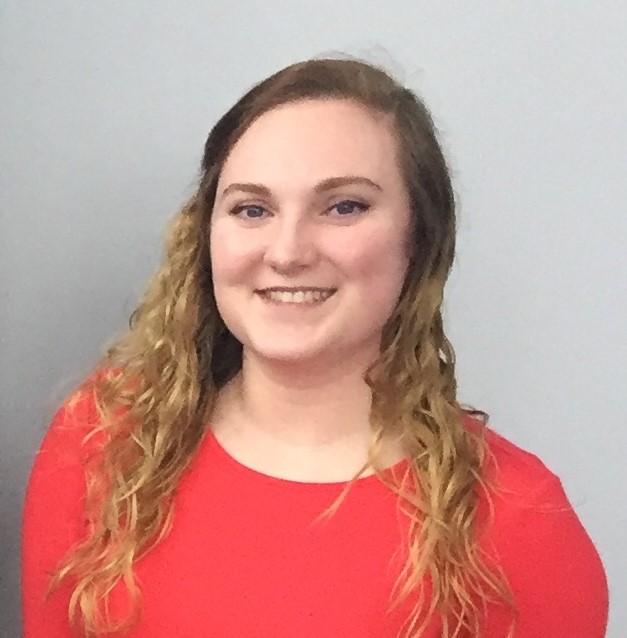 Shannon Myers is a first-year medical student at Lake Erie College of Osteopathic
Medicine. She is a recent graduate from Clarion University. She plans to become a
neurologist when she graduates, but is keeping her eyes open to all fields of medicine.
Shannon Myers is a first-year medical student at Lake Erie College of Osteopathic
Medicine. She is a recent graduate from Clarion University. She plans to become a
neurologist when she graduates, but is keeping her eyes open to all fields of medicine.
Hope Warner
 Hope Warner is a 2010 Clarion University graduate with her master's degree in speech
language pathology.
Hope Warner is a 2010 Clarion University graduate with her master's degree in speech
language pathology.
She was employed by the Riverview Intermediate Unit as a school-based speech language pathologist for six years before moving into the role of a Supervisor of Special Education for the last three years.
She is currently pursuing her principal certification through IUP. Hope plays an active role in the Clarion community, coaching a variety of Special Olympics sports, serving on the Special Olympics management team.
Her family was nominated as the Family Ambassadors for the United Way of Clarion County, and has recently become involved in the Clarion County Democrats (as her husband, Conrad, is running for state office).
Aimee Zellers, Ph.D.
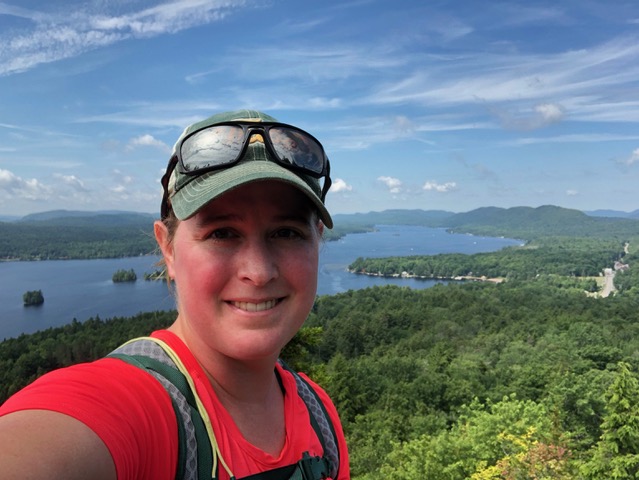 Aimee Zellers earned her Bachelor of Arts degrees from Clarion University in 2008,
double majoring in history and philosophy.
Aimee Zellers earned her Bachelor of Arts degrees from Clarion University in 2008,
double majoring in history and philosophy.
While at Clarion, she played soccer, was a member of the Delta Zeta Sorority, president of UAB, and student member to the Council of Trustees.
She furthered her education at Duquesne University with a Master of Arts in philosophy (2010) and a Ph.D. in Healthcare Ethics (2015). She is currently an assistant professor in the Humanities Department at Carlow University, where she served as the Michele R. Atkins Endowed Chair for Ethics Across the Curriculum (2013 – 2016).
In addition to her work in academia, Zellers also serves as clinical ethics consultant at UPMC Mercy and as an ethics committee member for LIFE Pittsburgh.